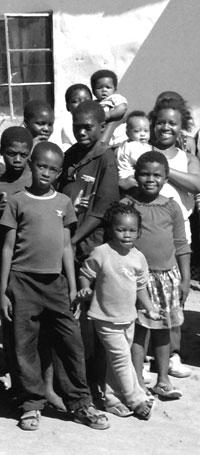The year 2007 marks a terrible milestone in human history: AIDS is 26 years old. In those 26 years, it has killed at least 28 million people and infected countless others across the world. AIDS affects everyone, regardless of race, gender, or sexuality, but it is the poor populations throughout the world who suffer the most, due to a lack of resources and action by the international community. Nowhere is this more pressing than on the African continent – South Africa alone suffers from a 21.5 percent HIV/AIDS prevalence rate, with some rural areas even suffering a 41 percent rate – and the most vulnerable members of society, the children, are who suffer the most. In 2005 alone, AIDS claimed the lives of about 2 million to 3 million lives. At least 570,000 of those were children.
That is what inspired UMass Boston student Yianno Pantazelos to start a chapter of Keep A Child Alive on campus. “I heard about Keep A Child Alive through a friend of mine, who’s worked for the organization in the past,” Pantazelos said. “I knew it was something that would be worthwhile to bring to the school.”
Keep A Child Alive is a non-profit, secular organization that provides anti-retroviral drugs to children with HIV/AIDS and funds housing projects for children orphaned by the epidemic. Its main focus is providing anti-retroviral, or ARV, drugs to children of African countries afflicted by AIDS. For $1 a day, one child can be given a drug regimen that will stave off the AIDS virus. Keep A Child Alive insists that 100 percent of these donations go directly towards funding ARV treatment, not towards overhead costs. One-time donations through the Web site go towards infrastructure-related costs, and to their secondary goal: building orphanages for children victimized by the virus in India, which has the highest rate of new infections in the world.
ARV treatment, the main ingredient of the “drug cocktail” heralded in the 1990s, has transformed the face of AIDS in the western world, extending dismal life expectancies by years, and even decades in some cases. Subsidies have made these treatments more affordable to citizens of impoverished countries, but ignorance about the AIDS virus still exists. In our not-so-distant American past, the misconception that only homosexual men were susceptible to HIV was common.
In Africa, AIDS-related myths are regarded as fact: AIDS is widely believed to be transmitted casually, not by contact with bodily fluids, and so AIDS victims are made into social outcasts by fellow citizens afraid to contract the virus. Children of AIDS-afflicted parents are abandoned regardless of infection status (estimates from Botswana alone suggest that 600,000 AIDS orphans live on the street). A popular myth states that sex with a virgin will cure the virus. No concrete data exists on how many people follow this advice, but these misconceptions are especially dangerous, considering that the World Health Organization reports that in Africa one in five female students reports that their first sexual experience had been coerced.
Pantazelos is in good company. Spokespeople for Keep A Child Alive include Alicia Keys, and Bono, to name a few. A list of Keep A Child Alive’s supporters reads like a who’s who of the film and music industries.
Keep A Child Alive is also a partner of Bono’s ONE campaign to end poverty and AIDS on the African continent. The goals of ending poverty and AIDS are intertwined, say ONE and the WHO. AIDS kills a large portion of work-age adults, destroying human capital and disrupting fragile emerging African economies.
Recently, UMass Boston’s chapter of Keep A Child Alive held fundraisers and a screening of the film “Yesterday,” about an African woman’s struggle with AIDS. “This semester we’re focusing on holding more fundraisers, getting more donations, which will in turn save human lives, and bringing awareness to the cause,” Pantazelos said.
For more information on Keep A Child Alive, visit the organization’s website at www.keepachildalive.org. For more information on Keep A Child Alive events on campus, visit the Student Life office or email Yianno Pantazelos at [email protected].

